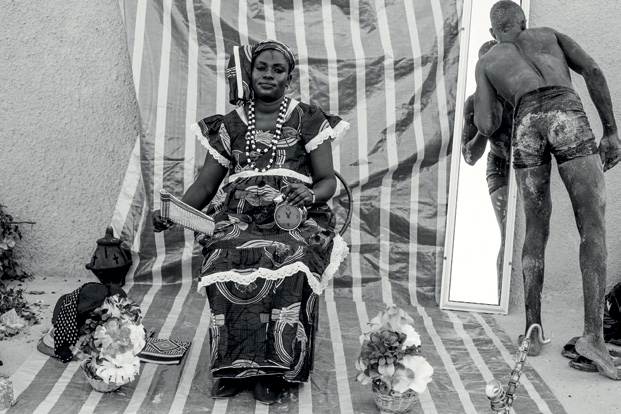Fatoumata Diabaté
Of Masks and Men
Fatoumata Diabaté is a strong female voice from West Africa who reinterprets the cultural and visual heritage of the continent in a new and often surprising manner.
Seydou Keita, Malick Sidibé, Samuel Fosso are some of the great masters who shaped African photography of the mid-twentieth century, and their distinct aesthetic serves as a visual model for Fatoumata Diabaté’s ongoing Studio Photo de la Rue (The Street Studio). This project is quite different from her documentary work, such as the one on chicken farms in Mali, as she communicates directly with her photographic subjects and offers to tell their stories. Through costumes, props and backgrounds, that take them back to the 1950-60s, they gradually enter into a role, which they can construct together with the artist.
Another body of work that is interesting in this context is her Man as an Animal, which was inspired by dreams and tales that have survived in the artist’s memory since her childhood. It was produced in Sikasso, Mali’s second largest city, and shows children playing animal roles, using simple masks that have been cut out from cardboard. Each portrait tells a story, each mask shows a character, such as the “wise monkey” or the “beggar”. These stories have been passed down from generation to generation, not as bed-time stories, but as explanations for the origin of the world, as moral and social guidelines for the community. Mythology and Anthropomorphism are powerful tools not only in religion, psychology and sociology, but—thanks to their great visual impact—also in art and popular cul-ture. Through masks and disguise, we can become part of the animal world and impersonate strange characters that stand for the untamed powers of nature. In terms of Western philosophy, we could speak of an Dionysian aes-thetic, and perceive our fascination for the animal kingdom as a longing for being part of an animistic world we no longer belong to. If we decide to believe Diabaté’s images, we can see that this connection is very much alive in the world she depicts, as the animals’ messages have remained decipherable myths and fables that reflect and even ensure our connection to the Universe. In this sense, the masks in Man as an Animal become mirrors held up to our human condition, and make us aware of these spiritual relations to our surroundings. Perhaps this even explains why animal filters are so widely popular on social media nowadays? But this seems to be another issue that would require a much deeper understanding for the human mind. In any case, we can state that the portraits of Fatoumata Diabaté renew the traditional narrative of African folk tales through pho-tographic storytelling, by linking the cultural heritage of her home country with visual citations and references to contemporary image-making. It is this elegant balance that has made her one of the leading figures on the West African photography scene.
Moritz Neumüller
FATOUMATA DIABATÉ studied at the Centre de Formation Audiovisuel Promo-Femmes in Bamako (CFP) between 2002 and 2004, and remained
there as a darkroom assistant until 2009. She defines herself as a portraitist and social photographer, and her work focuses mainly on women and the young generations of her home country, Mali.
MORITZ NEUMÜLLER is a curator, writer and contemporary photography and new media educator. He has worked for institutions such as the MoMA in New York orPhotoIreland, in Dublin.He currently directs the Master of Contemporary Photography at IED Madrid. Furthermore, he runs an online resource for visual artists, called The Curator Ship, and is chief curator of the Photobookweek Aarhus, Denmark.
#35 living with humans
Archive
- #45 hypertension
- #44 empathy
- #43 collecting
- #42 food
- #41 postdigital photography
- #40 earthlings
- #39 delight, pain
- #38 death, when you think about it
- #37 uneven ground
- #36 new utopias
- #35 living with humans
- #34 archaeology of euphoria
- #33 investigation
- #32 Non-work
- #31 Body
- #30 Eye In The Sky
- #29 Contemplation
- #28 Cultura / Natura
- #27 Cars
- #26 Documentary Strategies
- #25 Popular Music
- #24 Seeing Is Believing
- #23 Artificial Worlds
- #22 Image and Text
- #21 On Photography
- #20 Public Art
- #19 Film
- #18 80'
- #17 Amateur Photography
- #16 Photography and Painting
- #15 Prague
- #14 Commerce
- #13 Family
- #12 Reconstruction
- #11 Performance
- #10 Eroticon
- #9 Architecture
- #8 Landscape
- #7 New Staged Photography
- #6 The Recycle Image
- #5 Borders Of Documentary
- #4 Intimacy
- #3 Transforming Of Symbol
- #2 Collective Authorship
- #1 Face






